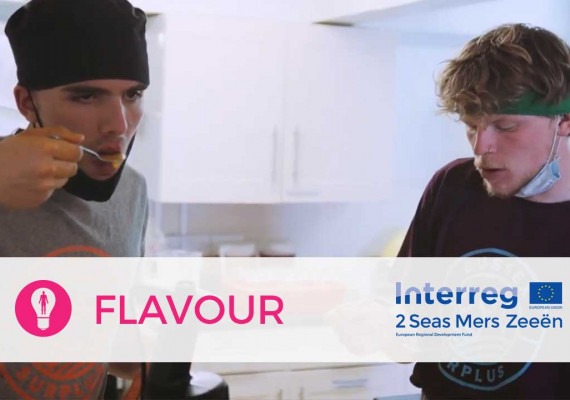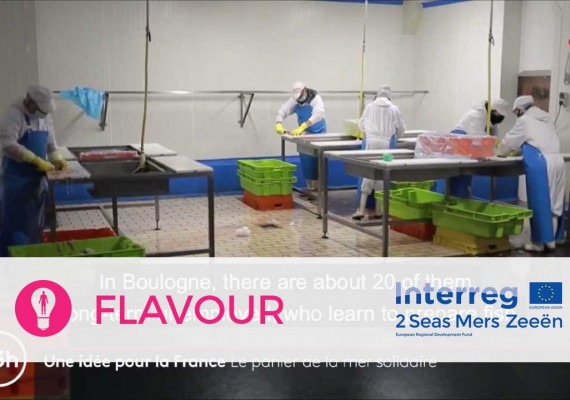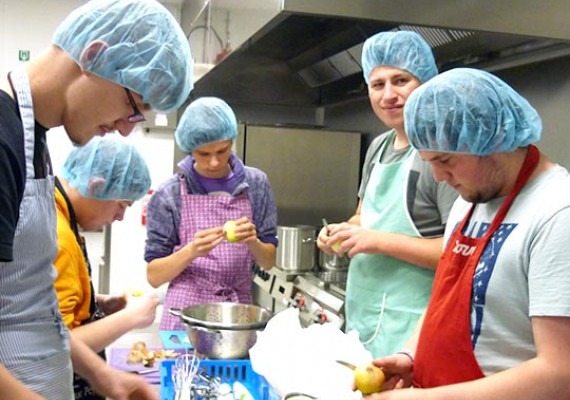FLAVOUR
Food surplus and Labour, the Valorisation of Underused Resources
Priority Axis
Technological and Social InnovationSpecific objective
Social Innovation
Lead partner
Herwin vzwContact
Start Date
01/09/2018End Date
30/09/2022Project budget
4 330 113 €ERDF amount
2 598 068 €ERDF rate
60%About
Common challenge
The 2 Seas Programme area is struggling to prevent food waste and to reduce the number of people experiencing food insecurity.
Approximately 30% of food production ends up as food waste. The OECD Employment Implications of Green Growth Report (2017) put waste management high on the list of sectors able to create jobs. This amount of food waste is no longer reasonable in these times of growing poverty (see Europe 2020 poverty indicators), increased pressure on land use and climate change. More food companies are working on reducing food waste and do see ‘reuse’ for human consumption as a possibility. However, the challenge is that collecting, distributing, and reprocessing food surplus is a labour-intensive and unpredictable business: food surplus is spread out over the country, often packaged in smaller quantities and with a limited shelf life, and quantities are only known at the moment of collection. For the food production sector, it is not obvious to quickly make a business case out of it.
The Flavour project tackled this through the valorisation of food surplus whilst simultaneously creating jobs, pathways to employment and supporting people living in food insecurity. It found new models to make the interception and redistribution of surplus viable.
Overall objective
Main outputs
Cross border approach
Main Achievements
Since 2018, FLAVOUR has been creating social employment by fighting food waste in Belgium, the UK and in France. By saving unwanted or surplus food, FLAVOUR created job opportunities for people who would otherwise struggle to access the job market.
Five Food Distribution Centres were improved or set up. They collected over 14,000 tonnes of surplus food from supermarkets, auctions, farms, and companies. The food was checked, sorted and frozen in a warehouse by employees and volunteers. Next, the food was distributed to social organisations such as food banks or social grocers. They provided affordable food for people in food insecurity.
Four Pilot Projects were also set up. These pilots looked for ways to preserve the food surplus for a longer time. E.G by making fish or vegetable soups, dehydrated vegetable packs, fermented products and salmon croquettes.
The Project outputs had significant specific impacts beyond the project lifetime. Thanks to the scientific research of VIVES hogeschool, FLAVOUR was able to conclude that every euro that was invested in the project, had a return on investment of more than 11 euros.
Furthermore, to support future initiatives, the project created two business models and an online tool for entrepreneurs. These materials will assist others in setting up or improving their social food surplus business.
Feedback Global created policy recommendations to improve food waste reduction and strengthen the social economy in the three countries. According to scientific conclusions and the FLAVOUR partners, policymakers should prioritise prevention of food waste to have the biggest impact.
As working with people in social employment or volunteers can be challenging, Marjon University and VIVES hogeschool created an online training guide to support coaches and managers on the workfloor. The guide provides visual materials and written information based on the experiences of the FLAVOUR partners and other scientific publications.
The achievement the partnership is most proud of is the Social Return on Investment (SROI). By using the Social Value Engine, designed by the Social Value Team in the UK, this method allows one to calculate a monetary value for social benefits resulting from their activities.
Testimonial
The project also shows that we need to be more careful with food. Not only because it is good for the climate, but also because it has a positive social impact.
The project has realized a Social Return on Investment of € 102,181,511, showing the importance of an inclusive social economy.



